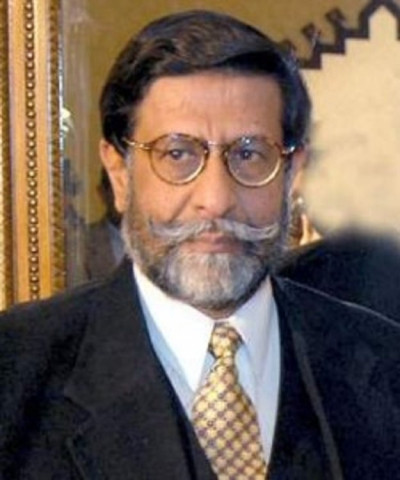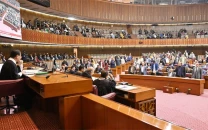11 profitable entities shortlisted for sell-off
PC drops all bleeding companies like PIA and PSM from its active list of privatisation.

Muhammad Mian Soomro. PHOTO: GOVT OF PAKISTAN
The government’s decision to either exclude or put on the backburner the privatisation of all loss-making entities is primarily aimed at protecting its political capital, which could have been at stake due to any unpopular decision.
It also put off the privatisation of nine power distribution and five generation companies.
The Privatisation Commission Board on Tuesday approved the new short to medium-term privatisation programme. Privatisation Minister Muhammad Mian Soomro chaired the first board meeting.
PIA privatisation a bad idea, says CEO
The board’s recommendations will now be placed before the Cabinet Committee on Privatisation that is expected to meet today (Wednesday) under the chairmanship of Minister for Finance Asad Umar.
The approved list of the Council of Common Interests –the highest constitutional body – contained 62 enterprises selected for privatisation.
Out of these, the board recommended to retain only 11 for active privatisation to be completed in the next three years.
However, it put the privatisation of another 24 enterprises on the backburner and dropped 29 loss-making companies from the privatisation programme, according to the officials of the Commission.
“The government wants to sell the profitable enterprises first to earn money,” said Soomro after the board meeting. “The privatization list has been proposed to be shortened,” he added.
Active privatisation list
The board recommended privatising four banking and insurance companies, three oil and gas sector companies, two LNG-fired recently constructed power plants, two hotels owned by PIA and one real estate sector transaction.
The board approved strategic sale of the loss-making SME Bank Limited, the First Women Bank Limited, and the Pakistan Reinsurance Company Limited.
It also approved to divest the shares of the State Life Insurance Corporation on the stock exchange.
The board approved three capital market transactions of the Oil and Gas Development Corporation Limited, the Pakistan Petroleum Limited and the Mari Petroleum Limited.
There was a striking similarity between the Pakistan Muslim League-Nawaz’s (PML-N) privatisation programme and the proposed plan of the PTI. The last government had undertaken six transactions –and five of them were divestment of the profitable entities at the stock exchange.
The board also approved strategic sale of 1,233 megawatts Balloki Power Plant and 1,230MW Haveli Bahadur Power Plant in the short term. It also approved strategic sale of the PIA Roosevelt Hotel in New York and the Scribe Hotel in Paris within next three years.
The board approved sale of assets of the Convention Centre Islamabad in the short-term.
Sources said the PC board members questioned government’s strategy for retaining the loss making enterprises. The decision has been taken despite the fact that the PSEs debt and liabilities surged to Rs1.3 trillion in the last fiscal year –higher by one-fourth in just one year, according to the State Bank.
The sources said the Privatisation Commission officials informed the board that if the government undertook privatisation of difficult entities like the PSM and the PIA, it could derail the entire privatization programme.
Dropped from privatisation
The PC board recommended delisting 29 companies from the list. It has excluded heavily loss making PIA. The Civil Aviation Authority has also been proposed to be delisted. Similarly, the PSM –another loss making enterprise – has been proposed to be dropped from the privatization list.
The National Bank of Pakistan, the Industrial Development Bank Limited and the House Building Finance Corporation have also been excluded. In the oil and gas sector, the Pakistan State Oil, the Sui Northern Gas Pipelines Limited and the Sui Southern Company Limited have been recommended to be dropped.
As many as 19 industrial units would be excluded from privatisation.
These are the National Fertilizers Corporation, the Pakistan Engineering Company, the Pakistan Industrial Development Corporation, Moafco industries, the State Engineering Corporation, the Sindh Engineering Limited, the Republic Motors Limited, the Pakistan Machine Tool Factory, the Pakistan Industrial and Technical Training Centre, the Export Processing Zone Authority, the Heavy Electrical Complex and the Pakistan Steel Fabricating Company.
The board has also proposed to delist the Pakistan Mineral Development Corporation Limited, the Lakhra Coal Mines, Services International Hotel Lahore, Pakistan Railways, Port Qasim Authority, the Pakistan National Shipping Corporation and the Karachi Port Trust.
Abbasi gives go-ahead to PIA, PSM privatisation
Enterprises put on hold
It endorsed the proposal to delay privatisation of 24 enterprises, nearly all of them causing huge annual losses. These include nine power distribution companies and five power generation companies.
The last PML-N government had done significant paperwork on the power sector that would now go waste. Privatisation of the Utility Stores Corporation of Pakistan has also been delayed. Privatisation of the National Investment Trust Limited and the National Insurance Company Limited is also deferred.
The National Highway Authority, the Telephone Industries of Pakistan and privatisation of the remaining 62.2% stakes of the Pakistan Telecommunication Limited have been delayed. The government also put sale of the National Construction Limited and the Printing Corporation of Pakistan on the backburner.



















COMMENTS
Comments are moderated and generally will be posted if they are on-topic and not abusive.
For more information, please see our Comments FAQ